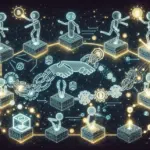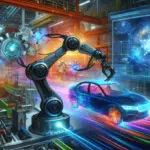The blockchain revolution paved the way for many innovations, cryptocurrency being a significant one. While most of us are familiar with cryptos, how many have heard of organizations that operate in a decentralized manner?
Yes, this article delves into Decentralized Autonomous Organizations – The DAOs.
Let’s get started.
What are DAOs?
Decentralized Autonomous Organizations, DAOs, are emerging as organizations that are formed by groups of people residing anywhere who collaborate towards a common goal. These DAOs don’t have a central leadership or a hierarchy. They work on the blockchain technology underpinning them and generally follow a bottom-up management approach.
What is a DAO token?
Generally, DAO has a native cryptocurrency that acts as a governance token. It lets the user become a part of the governance committee and have a say in future decisions. However, anyone in the DAO can propose ideas as long as they meet the basic requirement of having the minimum number of tokens that the DAO uses, for instance. In addition, a DAO token can be used for intra-network communications.
How DAOs work?
DAOs are primarily dependent on smart contracts. They are logically coded statements executed based on the underlying blockchain. For example, depending on the result of a decision, a certain code may be implemented to increase the circulating supply, burn a select amount of reserve tokens, or such. Besides, some DAOs also operate on off-chain voting systems like Snapshots where smart contracts are optional and mostly are used to notify decisions.
Each DAO formulates and implements its own voting power strategy that need not always depend on the number of tokens. They may also be dependent on more than one token.
DAOs commonly have treasuries with tokens that can be issued in exchange for fiat. The members of the DAOs can vote on how to use those funds, for example, some DAOs which intend to acquire rare NFTs can vote on whether to relinquish treasury funds in exchange for assets. However, DAOs can also form organized groups to take decisions on this.
Why were the DAOs created?
With the evolution of Bitcoin, blockchain technology gained prominence. As it enabled P2P transactions over the blockchain network, experts and developers started realizing the vast potential of blockchains.
Bitcoin blockchain demonstrated that transactions could be done without needing a third party. However, experts and developers thought of leveraging this concept and extending it beyond P2P payments to curate various domains including finance, media, philanthropy, social and more.
Thus, the DAOs emerged to accommodate the users’ needs. These organizations allow them to control their own experience and make decisions for the betterment of the organizations and the community.
What are the steps in creating a DAO?
Some of the core steps in developing a DAO include:
Build a Strong Foundation
As a first step, you need to discuss with your peers why a DAO is required, what will be its objectives, and how it will work. Clarifying the goal of a DAO is of primary importance to avoid any disagreements in the governance structure. Before investing, the founders look at various aspects such as the source of revenue, the technical details, and such. Though not always, DAOs often earn their income from dividends.
Determine Ownership
After arriving at the common objectives to be accomplished, the next step is to establish ownership which helps in the growth and development of DAOs. DAOs transfer ownership in multiple ways, as they offer the tokenization feature.
Set up a governance structure
The voting method is used to determine the governance structure. Token-weighted voting is the most common method of establishing decision-making rules. Voters are token holders, and voting power calculation usually involves several complex stages. This forms a critical aspect of setting up a DAO’s governance structure. Members can submit ideas using Snapshots, which have a feature known as strategies where we can set up a DAO that can schedule a voting power. In addition, Snapshots also have integrations with Gnosis to notify.
Set up reward
Contributors and DAO members are often offered rewards and incentives to foster trust and encouragement, typically in the form of distributed native governance tokens. However, these are tokens representing ownership only, they don’t have any market value.
Why should you implement DAOs?
DAOs offer a lot of benefits, which is why implementing them could help in multiple ways. Some of the benefits include:
Decentralization
DAOs have the potential to function as decentralized entities, in contrast to traditional companies where decision-making typically relies on a central authority such as a CEO or a small group like the Board of Directors. This would in the future prevent the concentration of power in the hands of a few and let everyone have equal participation.
Transparency
Members cast votes through the blockchain in a DAO, which are visible publicly. As the votes are visible to the public, it creates a responsibility on the part of users to act in the best way. This incentivizes actions that benefit voters’ reputations and prevent anything against the community.
Community
DAOs encourage people from all over the world to collaborate to accomplish a common objective. Token holders can communicate with each other from any location, as long as they have an internet connection.
Participation
People in an entity feel connected and encouraged only when they have a voice and voting power on all matters. These individuals may not have strong voting power, however, the DAO encourages token holders to cast votes, or use the tokens in the best way they feel.
Examples of DAOs
Uniswap
Uniswap, the most popular decentralized crypto exchange globally launched its token and became a DAO. It operates as one of the leading DAOs today, offering thousands of tradable crypto tokens as opposed to centralized exchanges which offer a few coins.
Compound
The compound is one of the popular lending DAOs in the DeFi space, allowing holders to earn interest on their holdings by locking it in platform pools. Among various DAO tokens, the Compound’s native token COMP has gained significant attention. Even though the currency is not one of the best options for investment, it shows considerable potential for sustainable growth in the future.
MakerDAO
MakerDAO is a decentralized global reserve bank that automates the collateralization and lending of its stablecoin DAI using Ethereum’s smart contracts. It cites the example of a decentralized central bank that operates on blockchain and provides a stable cryptocurrency like the stablecoin.
Types of Decentralized Autonomous Organizations
Based on the ways of working, structure, and technology, DAOs can be classified into various types:
Protocol DAOs
Protocol DAOs use tokens as a voting parameter to implement changes, creating a governance structure for the DAO. Some examples include MakerDAO, Uniswap, and more.
Collector DAO
Artists and creators who create their own NFTs depend on collector DAOs to establish ownership of their artwork.
Operating Systems
Operating systems, such as Colony, are standalone platforms that organizations use to create their DAOs.
Service DAOs
Some projects offer services like the MetaverseDAO which provides agencies with talent hunt and supports acquisition models, which is an example of Service DAO.
Social DAOs
Collaboration platforms like Blockster for social networking in the crypto space refer to social DAOs. These platforms enable democracy, ensuring that everyone’s voice is heard and allowing people with shared interests to collaborate.
Media DAOs
Media DAOs allow readers, who are the product owners of content, to contribute directly without involving advertisers for the native token as a reward for their contributions.
Investment DAOs
VentureDAOs, also known as pooling capital to democratize investing for DeFi activities, support this model. For example, Krase House, governed by basketball fans, operates in the National Basketball Association.
Final thoughts
Even, we still need to solve some issues and make improvements in the DAO state of the art, they will be very important for the future of the entire civilization. They hold the enormous potential to transform our ways of coordination. With Web3 imminent, DAOs will open the gateways to newer and brighter avenues.
Posted in Blockchain, Technologies





